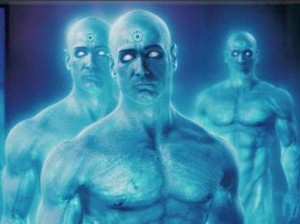In 1962, legendary film producer Dino de Laurentiis announced his plans to create a cinematic phenomenon, a multi-million dollar, multi-director, ten-hour production of the Bible with highlights from the Old and New Testaments. His efforts resulted in one director, John Huston, and the first twenty-two chapters of Genesis for the film The Bible…In the Beginning (1966). While Watchmen (the legendary comic book series from Alan Moore and Dave Gibbons) is not The Bible, it holds something of sacred status for its most ardent fans. A film version of this watershed comic book event has been in the works for decades with various producers, directors, and stars attached at different times. It finally releases on Friday, and I was lucky enough to catch a sneak preview of it this past weekend.
I’m not going to comment here on the Watchmen comic book series. Many more capable critics of the genre have and will continue to do so. Needless to say, any fan of comic books or, hell, a good story will find something captivating about the series, even twenty-three years later. It is impossible, however, to not compare the film to the comics, even though we should let the film stand on its own merits as a work of art.
For the first twenty minutes or so, Watchmen (directed by Zack Snyder) adheres, one might even say coldly, to the first book in the series. Each panel in the comic book is there, shot for shot. This seems to be a point of contention for the earliest negative reviews that claim that doing so robs the film of its own spirit or energy. For fans of the series, however, this shouldn’t be an issue. The film opens with a credit sequence that outlines the history of the Watchmen’s heroic predecessors, The Minutemen. The rest of the film tells the story about the titular heroes, The Comedian (Jeffrey Dean Morgan), Nite Owl II (Patrick Wilson), Silk Specter II (Malin Akerman), Ozymandias (Matthew Goode), Dr. Manhattan (Billy Crudup), and Rorschach (Jackie Earle Haley), as they face a potential serial “mask” killer and a disillusioned public that has grown angry with them. The comic book’s setting is all here as Richard Nixon approaches his fifth term in an alternative America that is still locked in the Cold War and on the brink of nuclear annihilation. One of the Watchmen has plans to end this Cold War, but at what cost?
One of the debates about filming Watchmen was whether or not the filmmakers should update the political setting of the story. (Un)fortunately, the books’ original scenario still works fine, thank you very much. The scenario raises apt questions about the price of peace during wartime and the role violence plays in purchasing and maintaining that peace. Fear grips citizens in the film, much like it plagues society today, and the politicians and powers-that-be know how to cash in on it.
 Speaking of violence, its presence in comic books have been a cause of concern for censors and critics ever since their inception (much like film), but rarely has it ever been as intense as the Watchmen series. Readers will immediately recall The Comedian and Rorschach’s violent enactment of their ideologies: non-readers should be prepared. The story’s violence is all here before our very eyes and, as such, becomes something of a counterpoint to the cartoonish violence of its contemporaries, although not in an over-handed way.
Speaking of violence, its presence in comic books have been a cause of concern for censors and critics ever since their inception (much like film), but rarely has it ever been as intense as the Watchmen series. Readers will immediately recall The Comedian and Rorschach’s violent enactment of their ideologies: non-readers should be prepared. The story’s violence is all here before our very eyes and, as such, becomes something of a counterpoint to the cartoonish violence of its contemporaries, although not in an over-handed way.
Watchmen fans with a theological bent will find much to dissect with Dr. Manhattan, the blue-bodied product of a science experiment gone horribly wrong. Dr. Jon Osterman turned into a superhero with near omniscience and omnipotence, and the American government has put him to “good” use to end the Vietnam War and to keep the Russians at bay. In an interesting way, the government’s use of Dr. Manhattan parallels our tendencies to see God as always on our side in an effort  to boost morale or justify foreign policy decisions. Yet Dr. Manhattan has a mind of his own, and his vacillation between being involved in human affairs and removed from them raises interesting theological questions concerning divine providence and theodicy. While Billy Crudup does not lend a God-like voice to the character, his voice does effect the intellectual (and moral?) detachment of someone who can see the bigger picture, the human narrative from beginning to potential end.
to boost morale or justify foreign policy decisions. Yet Dr. Manhattan has a mind of his own, and his vacillation between being involved in human affairs and removed from them raises interesting theological questions concerning divine providence and theodicy. While Billy Crudup does not lend a God-like voice to the character, his voice does effect the intellectual (and moral?) detachment of someone who can see the bigger picture, the human narrative from beginning to potential end.
As a superhero film, Watchmen sets a new benchmark for the genre, just as the series did for comic books. As a criterion for comic book films, it takes itself seriously…but not too seriously (see The Dark Knight). The film struggles slightly in clarifying or clearly presenting the public’s disaffection with their superheroes. Why are they angry at them? What did they do? What brought about the Keene Act? Answers to these questions are implied in the opening credit montage, but could have been further expounded upon in the course of the film. Ozymandias’ plan for world peace seems somewhat convoluted as well, but this is due, in no small part, to his limited role in the film.
I compared Watchmen to The Bible at the opening of this review, and I do believe it is an apt comparison. Fans of, or devotees to, both texts “get it.” As such, however, they are most attuned to the nuances and storylines that film adaptations of them simply cannot capture and might express frustrations at these “shortcomings.” They often miss what’s there by focusing on what’s not. People who are antagonistic to the texts will certainly not enjoy the films and find much to attack. Those simply unfamiliar with them might enjoy the show but not “get” what all the fuss is about. If the crowd reaction at Wonder-Con this past weekend is any indication, fans should be more than a little excited. I saw the film with a friend who had not read the book but who thoroughly enjoyed the film and shared my own minor critiques. He started reading the series the next day. Like any great film adaptation, Watchmen points its viewers back to the text by focusing on all that is right with the source material and further enhancing our experience of it, rather than diverting our attention from it.
Watchmen (160 mins.) is rated R for language, sex, and extreme violence and opens in theaters everywhere Friday, March 6. Go watch!












